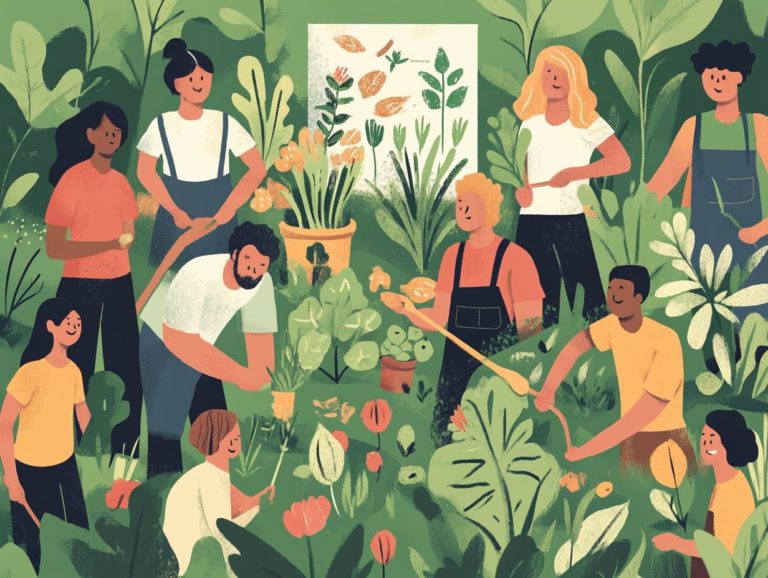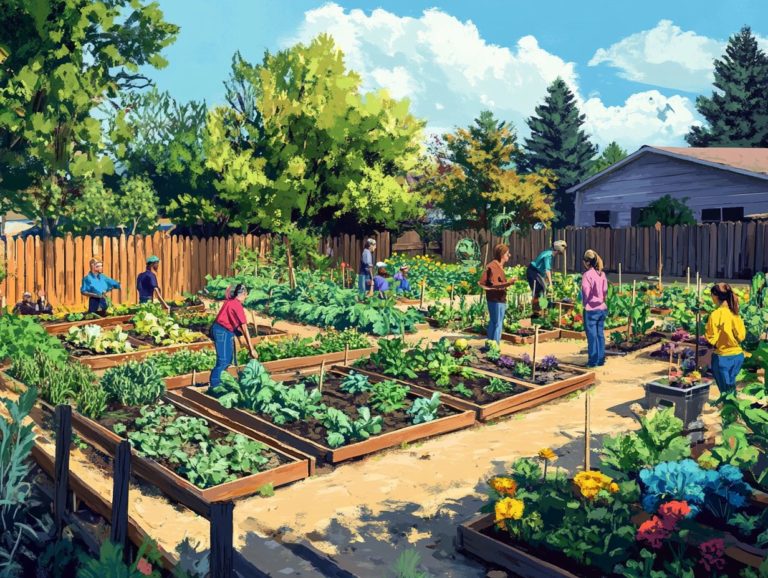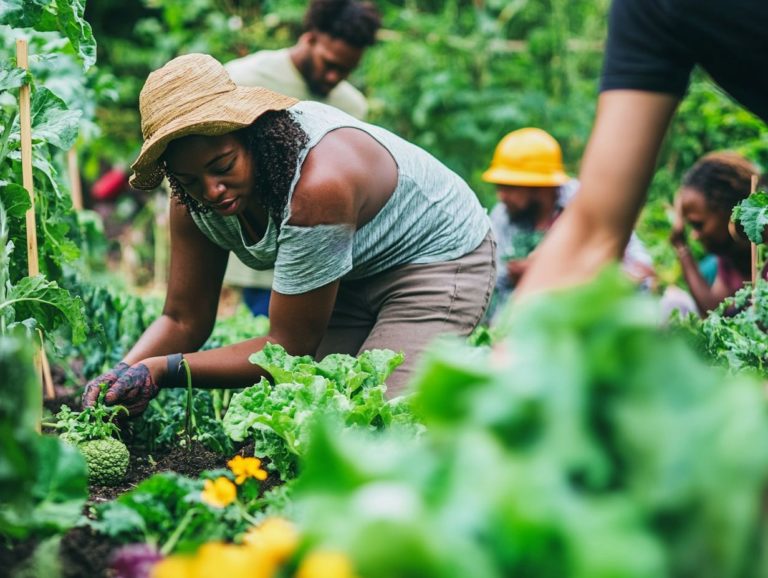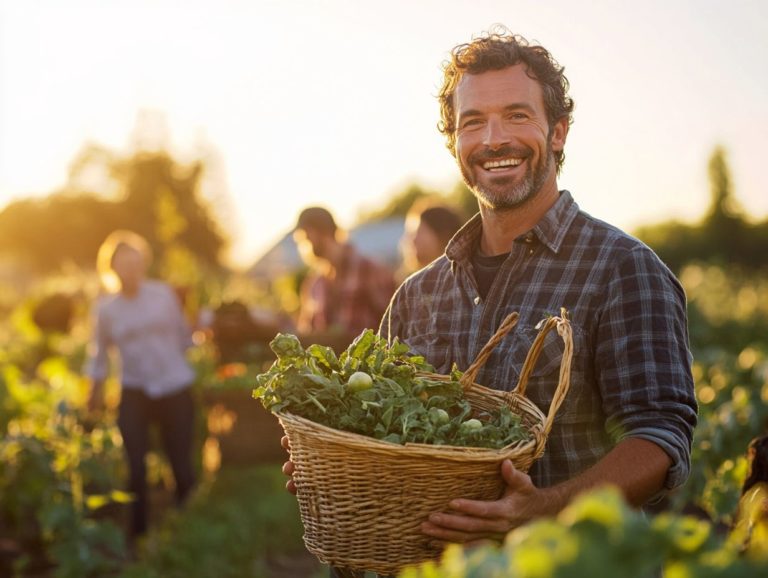36. 10 Local Farmers Markets Supporting Permaculture
In a time when sustainable living is paramount, permaculture presents a holistic approach to farming and building community resilience.
This piece delves into the connection between permaculture and local farmers markets, showcasing the benefits they share. You ll explore what permaculture entails and why it matters, while also discovering farmers markets that embrace these principles.
Through this journey, you ll gain valuable insights into how shopping locally at outdoor markets not only supports agriculture but also fosters a sustainable future.
Together, we ll uncover the crucial role these markets play in promoting environmental health and enhancing community well-being.
Contents
- Key Takeaways:
- 1. What Is Permaculture and Why Is It Important?
- 2. The Benefits of Shopping at Local Farmers Markets
- 3. How Do Farmers Markets Support Permaculture?
- 4. Farmers Markets That Embrace Permaculture Principles
- 5. [City/State] Farmers Market: Supporting Local Agriculture and Permaculture
- 6. [City/State] Farmers Market: A Hub for Sustainable Living and Permaculture
- 7. [City/State] Farmers Market: Promoting Community Resilience through Permaculture
- 8. How Can Consumers Support Permaculture at Farmers Markets?
- 9. The Impact of Permaculture on the Local Economy
- 10. The Future of Permaculture and Farmers Markets
- What Is the Role of Government in Supporting Permaculture at Farmers Markets?
- How Can Farmers Markets Implement Permaculture Practices?
- What Are the Challenges Faced by Farmers Markets in Supporting Permaculture?
- How Can Farmers Markets Educate the Community about Permaculture?
- What Are the Environmental Benefits of Permaculture at Farmers Markets?
- How Can Farmers Markets Collaborate with Local Permaculture Organizations?
- Frequently Asked Questions
- What does it mean for a farmers market to support permaculture?
- How many farmers markets are included in this list?
- Can anyone sell at these farmers markets or is there a specific criteria?
- Are all of these farmers markets located in one specific area?
- What types of products can be found at these farmers markets?
- How can I support these farmers markets and permaculture practices?
Key Takeaways:
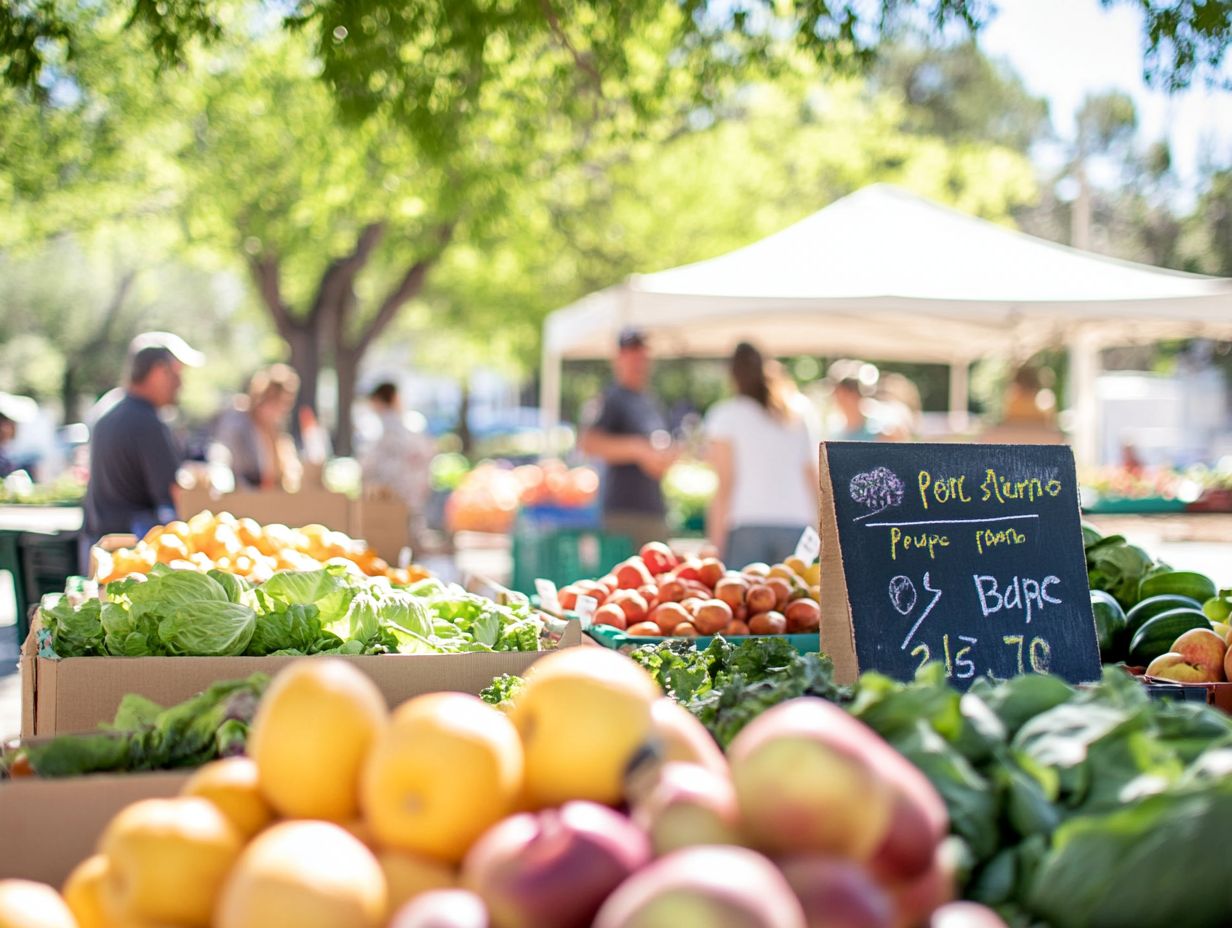
- Supporting permaculture at local farmers markets promotes sustainable living and strengthens community resilience.
- By shopping at local farmers markets, consumers can support permaculture and contribute to the local economy.
- Farmers markets can collaborate with local permaculture organizations to educate the community and implement permaculture practices for a more environmentally-friendly marketplace.
1. What Is Permaculture and Why Is It Important?
Permaculture represents an innovative approach to agriculture and land use, focusing on sustainable methods that integrate local ecosystems and bolster community resilience especially in regions like Greater Phoenix, where areas with limited access to fresh food and urban food security are critical concerns.
This method involves creating farming systems that emulate the patterns and relationships found in nature, fostering both biodiversity and soil health. By prioritizing principles such as conservation, recycling, and effective resource management, permaculture not only supports sustainable farming but also lays the groundwork for flourishing local economies.
It tackles urgent challenges related to food distribution, ensuring that healthy, locally sourced produce reaches underserved communities. A system where local people buy food directly from farmers is a vital component of this ecosystem, allowing you to connect directly with local producers. This model enhances farmers’ incomes while strengthening community ties, promoting a healthier and more resilient food system for everyone.
2. The Benefits of Shopping at Local Farmers Markets
Shopping at local farmers markets offers you a wealth of benefits, from accessing fresh, vibrant produce to supporting local artisans and fostering a sense of community all while promoting health equity and sustainable consumption, including market benefits for family farmers.
These markets prioritize food safety, giving you peace of mind as you know exactly where your food comes from and how it has been cultivated. Discover an exciting variety of organic options that empower you to make healthier choices that fit your dietary preferences!
By choosing to source your products locally, you actively contribute to reducing transport emissions, making a positive impact on the environment. Support family farmers with every purchase you make, helping sustain their livelihoods and preserve traditional agricultural practices.
The lively, communal atmosphere creates a unique shopping experience that strengthens connections between you and the producers, all while invigorating the local economy.
3. How Do Farmers Markets Support Permaculture?
Farmers markets play an essential role in bolstering permaculture by granting you direct access to fresh, organic foods sourced from local producers. They foster community outreach and enhance food safety standards, creating a nurturing environment for all involved.
These vibrant marketplaces are not just vital community hubs; they also celebrate and promote local culture, highlighting the significance of sustainable agricultural practices. By connecting you directly with local agricultural vendors, farmers markets empower you to make informed choices about your food, aligning your preferences with healthier and more environmentally-friendly options.
With a thoughtfully curated selection of vendors, these markets offer a diverse array of produce and artisanal goods, enriching your culinary experience while simultaneously supporting the livelihoods of local farmers. This relationship cultivates a sense of trust and transparency between you and the producers, reinforcing the ideals of permaculture in a meaningful and tangible way.
4. Farmers Markets That Embrace Permaculture Principles
Numerous farmers markets throughout Greater Phoenix have wholeheartedly embraced permaculture principles. They craft specialty markets that prioritize local producers and sustainable practices. This approach enhances urban food security in the region and contributes to a thriving community spirit.
These markets go beyond just offering fresh, seasonal produce. They provide a vibrant platform for artisanal crafts and community engagement. For instance, at the Phoenix Public Market, you ll find a diverse selection of organic vegetables and fruits. Local artisans showcase their handmade goods, creating a lively atmosphere.
The Uptown Farmers Market distinguishes itself with its commitment to community-supported agriculture. This means you can buy a share of what local farms grow. Similarly, the Agritopia Farmers Market champions the concept of the right to access healthy food. You can participate in workshops on sustainable gardening while soaking in the lively culture fostered by its local vendors. Don’t miss out on the unique experiences and fresh flavors waiting for you at these markets this weekend!
5. [City/State] Farmers Market: Supporting Local Agriculture and Permaculture
The [Insert City/State] Farmers Market stands as a vital hub for elevating local agriculture and championing permaculture principles. It creates an inviting space for community engagement and direct access to fresh, wholesome foods.
Open every Saturday from 8 AM to 1 PM, the market showcases a carefully curated selection of vendors. These vendors meet rigorous standards for quality and sustainability. Each vendor is handpicked based on their dedication to organic practices and local sourcing.
Here, you can explore a delightful assortment of seasonal fruits and vegetables, artisanal cheeses, homemade jams, and delectable baked goods.
By attending, you not only strengthen the local economy, but you also become part of an exciting community movement. You savor fresher options and help nurture a healthier ecosystem and vibrant community spirit.
6. [City/State] Farmers Market: A Hub for Sustainable Living and Permaculture
![Vibrant scene at [City/State] Farmers Market showcasing local produce and crafts.](https://permplant.com/wp-content/uploads/2024/09/36-10-local-farmers-markets-supporting-permaculture-Bb.jpeg)
The [Insert City/State] Farmers Market stands out as a beacon of sustainable living. It embodies the values of permaculture and serves as a model for health equity and community resilience in your area.
This vibrant marketplace invites you to embrace organic farming practices. You can enjoy local produce that is fresh and free from harmful pesticides. Vendors prioritize waste reduction, engaging in composting and reusable packaging initiatives.
Here, you ll find a rich tapestry of local culture. The market showcases regional foods and artisanal crafts that reflect your community s shared heritage. Through community-supported agriculture, you can invest directly in the local economy, strengthening connections and cultivating a profound sense of belonging.
Such engagement promotes sustainable living and nurtures a collective responsibility for creating a healthier planet.
7. [City/State] Farmers Market: Promoting Community Resilience through Permaculture
The [Insert City/State] Farmers Market nurtures community resilience by embracing permaculture practices. These practices enhance local food distribution networks and empower you to engage with your local food systems.
Beyond its commitment to eco-friendly practices, the market serves as a vital educational hub. It offers a variety of workshops focused on sustainable agriculture, nutrition, and cooking. These initiatives enrich your knowledge and foster a sense of belonging among community members.
By partnering with nearby farms, the market ensures that fresh produce is consistently available. This supports local economies and reduces reliance on imported food. Its outreach programs specifically target food deserts and low-income neighborhoods, providing subsidies and incentives that make healthy food accessible to everyone.
This effort cultivates a more equitable food landscape for all.
8. How Can Consumers Support Permaculture at Farmers Markets?
You can actively support permaculture at farmers markets by choosing to buy directly from local producers, taking advantage of programs like SNAP and other market operations, and advocating for sustainable practices within your community.
By prioritizing organic foods, you encourage eco-friendly farming. This also nurtures a healthier lifestyle for you. Engaging in community outreach initiatives, like farm tours or workshops, helps deepen your understanding of sustainable practices.
Embracing the local culture through arts and crafts supports artisans and enriches your community’s identity. Your participation in these activities reinforces the principles of permaculture, ensuring your purchasing power contributes to a more resilient and sustainable food system.
9. The Impact of Permaculture on the Local Economy
The implementation of permaculture principles can significantly enhance the local economy by creating robust opportunities for farmers markets and improving food safety through better practices and local sourcing.
This approach creates opportunities for job creation. It also fosters community engagement, as you and your neighbors become more invested in sourcing fresh, sustainable produce. By bridging the gap between local producers and consumers, permaculture cultivates a dynamic marketplace where goods are exchanged directly, thereby supporting small businesses and local artisans.
Reducing transportation costs benefits the economy, as products travel shorter distances, slashing fuel expenses and minimizing the carbon footprint.
When communities gather at farmers markets, they enrich their diets while simultaneously stimulating economic growth through local spending. This establishes a powerful cycle of support that bolsters the resilience and prosperity of the entire region.
10. The Future of Permaculture and Farmers Markets
The future of permaculture and farmers markets is bright! It reflects the growing consumer demand for sustainable practices and healthy foods that drive innovation and community initiatives nationwide.
With a strong focus on organic farming methods and the variety of plant and animal life, these markets are evolving into vibrant hubs that provide fresh produce and educate you on the principles of eco-friendly growing.
Technologies like mobile apps for local farm produce and online ordering platforms bridge the gap between farmers and you, enhancing accessibility and convenience.
As workshops and community events become increasingly common, a palpable sense of connection among participants emerges. This flourishing community engagement raises awareness of permaculture principles, transforming agricultural practices and your consumer habits towards more responsible choices.
What Is the Role of Government in Supporting Permaculture at Farmers Markets?
The government plays a crucial role in supporting permaculture at farmers markets through policies and programs that champion sustainability, local agriculture, and community engagement, in alignment with the initiatives from the U.S. Department of Agriculture.
Programs like the Farmers Market Promotion Program (FMPP) and the Specialty Crop Block Grant Program are essential, as they provide financial assistance directly to local vendors, empowering them to flourish.
These initiatives ensure sustainable agricultural practices and promote investment in community infrastructure.
Regulatory frameworks that streamline access to funding and reduce bureaucratic obstacles enable agricultural vendors to market their products more effectively.
By creating incentives for local producers, these policies contribute to a robust local economy, ensuring that fresh, organic produce reaches you while reinforcing community ties.
How Can Farmers Markets Implement Permaculture Practices?
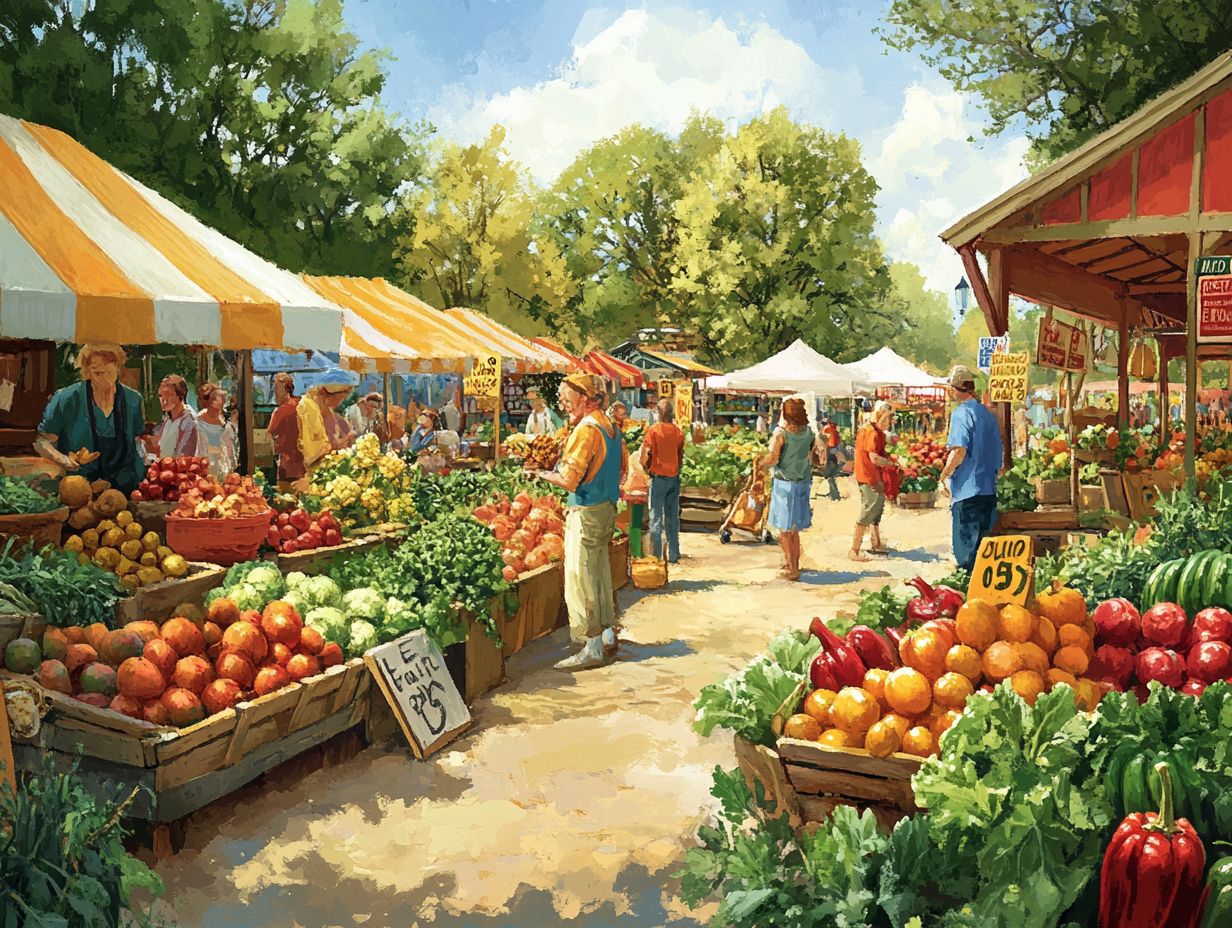
Farmers markets can thrive by embracing permaculture practices. This fosters community outreach, promotes biodiversity, and ensures sustainable sourcing from local producers.
By integrating techniques like composting, crop rotation, and innovative water conservation methods, markets can elevate both the environmental impact and the overall experience for visitors. Composting reduces waste and enriches soil health, resulting in fresher produce that consumers are eager to savor.
Crop rotation maintains soil fertility, leading to a delightful variety of seasonal offerings that keep market-goers returning. Implementing water conservation measures preserves precious resources and educates the community on sustainable practices, ultimately building a more involved community enthusiastic about supporting eco-friendly initiatives.
This holistic approach benefits the environment and nurtures a deeper sense of community among local farmers and consumers alike.
What Are the Challenges Faced by Farmers Markets in Supporting Permaculture?
Farmers markets grapple with various challenges in their quest to support permaculture. Navigating vendor selection, tackling food deserts, and ensuring fresh produce is accessible to everyone can be complex.
Markets face hurdles like funding limitations that stifle growth, regulatory complexities that complicate food safety compliance, and stiff competition from larger retailers. To address these issues, explore collaborative funding options such as community grants and engage closely with local government to streamline regulations.
Building strong relationships within the community and highlighting the unique benefits of locally sourced produce can cultivate a loyal customer base. This encourages shoppers to choose farmers markets over larger chains, fostering a vibrant, sustainable local food culture.
How Can Farmers Markets Educate the Community about Permaculture?
Farmers markets can educate the community about permaculture through engaging workshops, demonstrations, and outreach programs that deepen the understanding of sustainable practices.
Introduce cooking classes that teach healthy meal preparation while highlighting the importance of using fresh, locally sourced ingredients. Gardening workshops empower individuals to cultivate their own food, equipping them with valuable skills that bolster food security.
Imagine informational booths as knowledge hubs where visitors can learn about nutrition, seasonal eating, and the advantages of supporting local farmers. By weaving local culture into these initiatives and promoting health equity, farmers markets can become vibrant spaces that foster community connections and encourage healthier lifestyles.
What Are the Environmental Benefits of Permaculture at Farmers Markets?
The environmental benefits of integrating permaculture practices at farmers markets are impressive. These include enhanced biodiversity, reduced transport emissions, and improved soil health all pivotal elements in cultivating a more sustainable food system.
By fostering diverse plant species and resilient ecosystems, permaculture nurtures local wildlife and strengthens community bonds through shared agricultural practices. Farmers market vendors who utilize rainwater harvesting and composting techniques significantly reduce resource consumption, leading to a smaller carbon footprint.
Support for local permaculture farms promotes sustainable agriculture by reducing the need for long-distance food transportation, which lowers greenhouse gas emissions. A prime example is community-supported agriculture (CSA) programs, which connect local producers to consumers, creating a vibrant cycle of locally sourced, environmentally friendly produce.
Join your local farmers market today and support sustainable practices!
How Can Farmers Markets Collaborate with Local Permaculture Organizations?
Collaboration between farmers’ markets and local permaculture organizations can boost community engagement dramatically and promote sustainable practices, ultimately amplifying the success of both entities.
By hosting joint events think seasonal harvest festivals or workshops on sustainable farming techniques you can draw in a diverse audience. This creates a vibrant space where community members learn from one another.
Pooling resources to develop educational programs will provide invaluable insights on nutrition and eco-friendly practices and empower local residents in the process.
This collaboration supports small businesses and boosts local economies, revitalizing local economies and cultivating resilience within the community. It positions the community to tackle environmental and social challenges head-on.
Frequently Asked Questions
What does it mean for a farmers market to support permaculture?
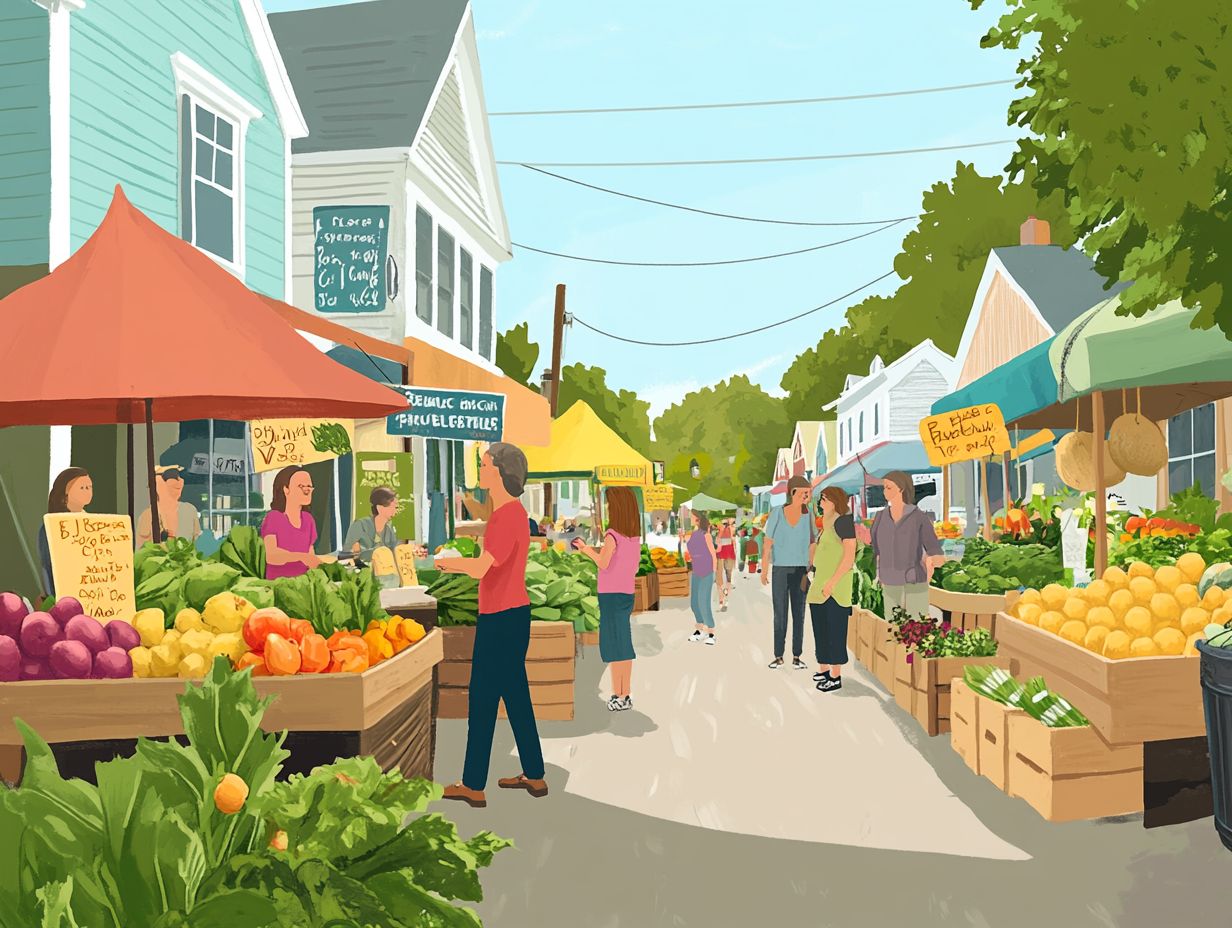
Supporting permaculture means that the farmers market promotes and encourages sustainable farming practices that work in harmony with nature, rather than against it.
How many farmers markets are included in this list?
This list includes 10 local farmers markets that advocate for sustainable farming practices, including community farmers and outdoor market options, along with local resources for organic gardening.
Can anyone sell at these farmers markets or is there a specific criteria?
Each farmers market has its own vendor selection criteria, but generally, they prioritize local and sustainable farmers who practice permaculture and contribute to the local economy.
Are all of these farmers markets located in one specific area?
No, these 10 farmers markets are spread across various communities, like Phoenix and Chandler, providing access to permaculture products for a wider population and enhancing urban food security.
What types of products can be found at these farmers markets?
These farmers markets may offer a variety of products, including organic fruits and vegetables, fresh produce, sustainably raised meats, and specialty markets featuring handmade goods from local artisans.
How can I support these farmers markets and permaculture practices?
Support these farmers markets today! Shop from local vendors and make a difference by learning about permaculture principles and participating in community outreach initiatives to spread awareness about the importance of supporting permaculture in our food systems.

